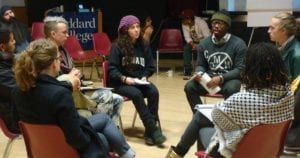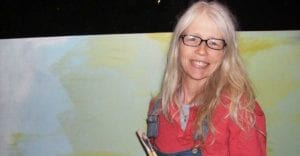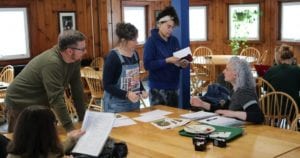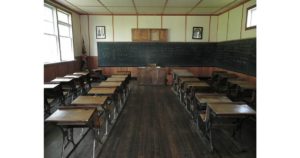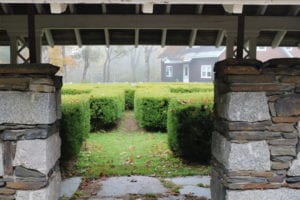
With this blog post we begin a new tradition, that of publishing a piece by a graduating student at the end of each residency. Fly far, Joe Norton!
By Joe Norton
About ninety per cent of the books on my shelves are plays. Even before I came to Goddard, I’ve always gravitated toward reading plays over other books, which makes sense, as I am a playwright myself. I look for inspiration in other playwrights’ works. I love reading plays as much as I love seeing them, even though the two experiences are for me vastly different ones. Since coming to Goddard, I now also read plays to enrich my own craft and to strengthen my own process, which doesn’t mean I enjoy reading them any less. Looking back at my overall study plan, about ninety per cent of my entire Goddard reading list is plays. These are what I most wanted to study, what my advisors mostly guided me toward – and what are the subjects of all but two of my 45 annotations.
As an early G1, annotations scared me. Once I began writing them, however, I discovered that I really enjoyed close reading with a highlighter and some sticky Post Its. I understood craft as “anything besides symbolism and theme,” so I just started making notes until something grabbed my attention. Once I had chosen my topic, I re-read the play to be sure I could state and defend my thesis, and then to identify the best quotes to use to exemplify my points. I took to the form rather quickly, so it was a fun challenge to complete them. (Besides, my prose needed polishing, so it was good for me to have to consistently write short papers.)
I actually enjoyed all of the critical writing I had to do here at Goddard, but annotations informed my creative work by providing me opportunities to “borrow” from other playwrights. Many times, I attempted to recreate what I had just annotated: for instance, I tried overlapping the dialogue between my two main characters to create a power exchange, which is what Stephen Karam does in his opening scene for Sons of the Prophet. It didn’t quite work for my play the way that it does for Karam’s play, but I was able to build on the idea of establishing a power struggle to start the play; hence, my annotation informed my creativity enough to try something I hadn’t yet thought to try. Also, through annotations I began to see new things in those plays I thought I knew so well, while at the same time training myself to read new plays with a sharpened, more critical eye. I don’t know that I’ll ever stop annotating plays now (or movies, or TV shows). Even though I may not document what I discover as I watch or read, I still feel like a spy moving quietly through the work, past plot and character and dialogue, speedily past symbolism, even past action, to the subtler and sometimes intentionally hidden elements of the playwright’s craft. I have so much more fun experiencing plays – live or on the page — as a direct result of my having annotated so many.
Sure, I write other stuff besides plays. I suspect most of us dabble or even excel in more than one genre. I’ve owed someone a short story draft for some time now; I should get on that. And I get a lot out of sharing work with all types of writers, which is why I love the residencies so much. (Oh, to be a poet, right?) Today, I am the only playwright in my local writing group, a fact which lessens neither my contributions to our meetings nor my colleagues’ feedback of my work. Writers can learn from other writers, even across genres. Still, I had to spend most of my time at Goddard within my own genre of playwriting. In order to create what I wanted to create, I had to stay within the borders of my own state of mind.
In my G4 advising group with Deborah Brevoort, all but one of us identified as dramatic writers. Deb herself is a well-known playwright and librettist. Brad is also a librettist. Aleesha, Tanya and I are playwrights, and Mary is a screenwriter. Diana writes creative non-fiction. We were a tight group; our sessions were fun and informative. Though we focused mostly on dramatic writing for our exercises, I never got the sense that Diana felt any less a part of the group. While the rest of us presented scenes that we crafted from a given prompt, Diana exercised her prose to complete the assignment in a way that always impressed me.
https://books.google.com/books?id=ITdYYOK3cTkC&lpg=PP1&pg=PP1#v=onepage&q&f=false
For our group annotation, Deborah assigned Dreamlandia, by Octavio Solis, a Latino playwright born in Texas to Mexican parents. In Dreamlandia, Solis’ characters move between fantasy and reality, from past to present in their struggle for cultural identity, citizenship and family in the opposite border towns of Ciudad Juarez, Mexico, and El Paso, Texas. (Solis grew up in the latter.) The action takes place along both banks of the Rio Grande River – and in the river itself, where one man keeps his son in a cave on an island while ghosts of their ancestors rise from the water. There is much more to the plot, of course, and Solis rolls it out in a non-traditional structure with dialogue that is often hilarious. Deb thought it a timely and necessary piece for us to discover and dissect, given our new President’s promises to erect a wall between Mexico and the United States. (Dreamlandia was published in 1970 as part of a trio by Solis, The River Plays. Art imitates life; life imitates art, and so on.)
Deb arranged for us to have an email conversation with the playwright, so that each of us could ask Solis about the subjects of our respective annotations. Here are some of his responses that stayed with me (excerpted here for brevity):
Mary asked Solis about his use of “Spanglish” in the play. Solis replied: “…the use of Spanglish isn’t in my plays just because that’s how we expressed ourselves in the world. In my plays, it’s an expression itself of the dual nature of my characters. People who feel the tug of both cultures… Spanglish perfectly describes that line that cuts across our hearts, that also cuts across the central seam of the Rio Grande, the demarcation line that says you’re not this, but this, even as the nation says it doesn’t matter.”
When Brad compared Solis to Shakespeare, Solis confirmed: “(Shakespeare) is a model for me. He invented language when it suited him. He didn’t have a lexicon, …just flowering language called Renaissance English. But when he could find no word that both fit the meaning and scanned the verse, he made it up.”
I asked Solis how he managed to get so many locales into his play, as I was wrestling with this in my own work. His response was basically Diana’s entire annotation. Diana wrote about how Solis offers but a word or two of set description for each scene in the play, then lets his characters detail the locations through their dialogue and their actions. The one writer in our group to admit to never before having read a play, zeroed in on the one aspect of Solis’ craft that I had completely overlooked. And when Solis answered me, then Diana, he reinforced what she had written, while at the same time circling back to include everything Mary and Brad had written, as well:
“I draw all my lessons about location from Shakespeare. Since most of my plays are episodic, one has to design a set that can function as all these locations. A bare stage is optimal. The world comes on with the characters; they speak the place into being. Lighting helps. …a few props …Levels …but above all, it’s the language that sets up the world of the scene. That’s why my language is kinda dense and descriptive sometimes. Like so:
DOLORES. Ruda, romero, passion flower, yarrow. Cascara sagrada, yuerba Buena. Yellow shame. All my remedies crowd the river banks, catching wind and drowsy bees on their buds. If you doze off, they’ll catch your daydreams, too.
We don’t need a single flower on stage… with language. Only theatre can do this. Because it requires the audience’s imagination to complete the picture. …In the original production of Dreamlandia, the river was anywhere we wanted it to be. Sometimes it was a line that broke the stage in half with actors on either side of it. Sometimes, the river was the audience. The banks shifted from place to place like a dream. Because it was kind of a dream.”
Everyone in the group helped me a little. But Diana’s keen observation makes me realize that I’ve got a lot to gain by leaving my own borders every now and then. So maybe it’s time for me to read something other than plays. Time to step out of my zone and experience different things for a while. As I’m putting together my summer reading list, I’m going to select some good novels, some collections of short stories and yes, some poetry. And for Diana, a memoir or two.
I believe that my advisors served me well. They guided me toward becoming a better dramatic writer. I needed what they offered. But if I am a writer now, and I am, finally, then it is time for me to move beyond my own borders. It is time for me to travel to the places where other writers go.
Borders serve a purpose. But as Solis taught us, they also hold us back from achieving our dreams.
Joe Norton (Playwright) is the author of several plays, including ROOM and COFFEE BOX (East Village Theatre Co.); SCHOOL NIGHT (Published by Playscripts, Inc.); THE TRUING (NYC Fringe Festival 2014); JETTY (Bristol Valley Theatre Co); and his latest, THE MOONACHIE MAN. His plays have been performed in New York, California, Nebraska and in Scotland. Joe teaches playwriting and social justice theatre workshops at festivals across the country. He lives in NYC with his husband, Jason, and their Siberian Husky, Ace. Member: DGA, The Playwrights Center. He will receive his MFA in Dramatic Writing in July, 2017.


